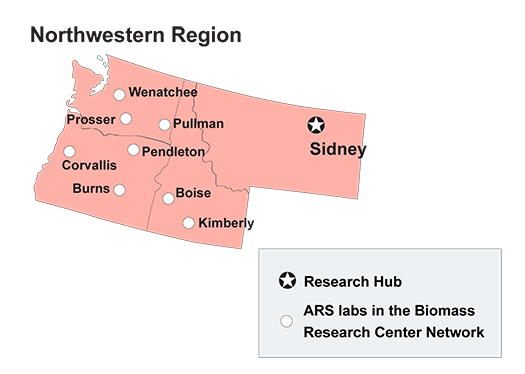| NW Biomass Research - Sidney, MT |

|
Northwestern Regional Biomass Research Center
The Northwestern Regional Biomass Research Center (NWRBRC) is a network of existing USDA-ARS facilities and scientists located in Washington, Oregon, Idaho, and Montana. The NWRBRC is a multidisciplinary research (biological, chemical, and physical) organization focused on biological feedstocks that are unique to the northwestern US region. NWRBRC is one of five regional USDA Biomass Research Centers established in 2010 by USDA Secretary's Office of Science to coordinate different research disciplines and approaches within ARS leading to development of integrated solutions contributing to sustainable biofuel supply chains based on agricultural feedstocks.

Associated Locations of the Agricultural Research Service, Northwestern Regional Biomass Research Center
The USDA estimates that 1-billion gallons of advanced biofuels will be produced from feedstocks derived from the Northwestern region that will contribute 4.6% of the 21-billion gallons required under the latest version of the Renewable Fuel Standard (RFS2). Primary focus for ARS research is on the incorporation of oil seed crops into existing cereal-based production systems. Significant consideration is also given to the sustainable utilization of crop straw post-harvest residues with specific attention given to maintaining soil carbon levels after harvest and the prevention of soil erosion. Oil seed crop efforts will be in conjunction with efforts conducted by the Western Regional Center, with an emphasis on the integration of expanded production and minimization of its impact of existing wheat-based production systems. ARS is also focused on the restoration of western rangelands through the harvest and removal of invasive western juniper and pinion pine trees.
Research Highlights
- Accomplishments Report (2019) - pdf 133Kb
- Accomplishments Report (2018) - pdf 154Kb
- Accomplishments Report (2017) - pdf 143Kb
- Accomplishments Report (2016) - pdf 279Kb
- Accomplishments Report (2015) - pdf 280Kb
- Accomplishment Reports (2010-2014) - pdf 163Kb
Research Focus Areas
The NWRBRC has three research focus areas: (1) Feedstock development, (2) Feedstock Production, and (3) Conversion and Co-Product Utilization.
Feedstock Development
Scientists screen annual and perennial crops and their cultivars for resistance to lodging, disease, herbicides, and drought and heat to determine their suitability for production within different growing environments within the region. They also determine the chemical composition of various resulting feedstocks that influences thermo-chemical conversion and ethanol yield, and ascertain the relative energy benefits and environmental impacts that are associated with growing bioenergy crops.
Feedstock Production
Field experiments comparing germination and stand establishment, winter hardiness and survival, water and nitrogen use, residue decomposition, weed control, biomass yield, profitability, and other aspects of cultivation are conducted to determine best cultural practices for producing various bioenergy crops. Crop rotation studies are undertaken to identify optical rotation strategies for integrating biofuel crops into traditional cropping systems. New mechanical systems and methods are developed for harvesting biological feedstocks and transporting them to conversion plants.
Conversion and Co-Product Utilization
Researchers evaluate the breakdown and conversion of various biological feedstocks (crop residues, woody material, and municipal waste). In addition, they develop systems for farm-scale conversion of straw to energy and ascertain the potential usefulness of co-products of conversion e.g., oilseed crop residue as a biofumigant to control soilborne pathogens, bio-char as a soil amendment for stabilizing soil carbon, and distillers grains as a source of soil nutrients.
